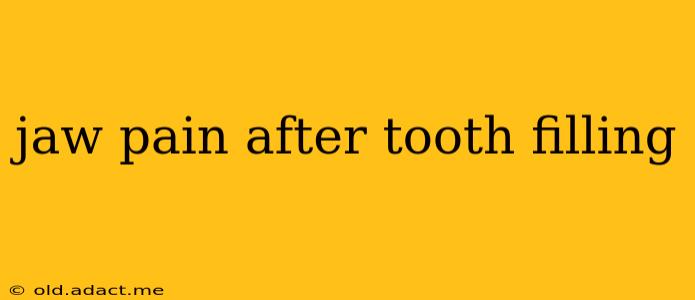Experiencing jaw pain after a tooth filling is a common concern, and it's crucial to understand the potential causes and how to address this discomfort. While sometimes the pain is minor and resolves quickly, in other instances, it warrants professional attention. This comprehensive guide explores the various reasons behind post-filling jaw pain, offering insights into effective treatment options and preventative measures.
Why Does My Jaw Hurt After a Tooth Filling?
Jaw pain following a dental filling can stem from several factors, not all directly related to the filling itself. The most common causes include:
-
Inflammation and Irritation: The filling procedure, even a minor one, can cause some inflammation in the surrounding gum tissue and jaw. This is often temporary and subsides within a few days.
-
TMJ (Temporomandibular Joint) Disorder: The temporomandibular joint connects your jaw to your skull. Stress, teeth grinding (bruxism), or even the altered bite caused by a filling can exacerbate existing TMJ problems or trigger new ones, leading to jaw pain.
-
High Filling: If the filling is placed too high, it can interfere with your bite, causing pain in your jaw, teeth, and even your temples.
-
Infection: In rare cases, an infection can develop at the filling site, leading to more severe pain that may radiate to the jaw. This requires immediate dental intervention.
-
Sinus Infection: Pain originating in the sinuses can sometimes be mistaken for jaw pain, especially with upper teeth fillings.
-
Muscle Strain: The process of adjusting to a new filling might cause you to unconsciously clench or tense your jaw muscles, resulting in pain.
How Long Does Jaw Pain After a Tooth Filling Last?
The duration of jaw pain after a tooth filling varies significantly depending on the underlying cause. Mild inflammation typically resolves within a few days. However, if the pain persists for more than a week, or worsens, it’s essential to consult your dentist. TMJ disorders, for instance, may require ongoing management.
What Can I Do to Relieve Jaw Pain After a Tooth Filling?
Several home remedies can provide temporary relief from mild jaw pain:
-
Over-the-counter pain relievers: Ibuprofen or acetaminophen can help manage pain and inflammation. Always follow the dosage instructions.
-
Warm compresses: Applying a warm compress to the affected area can soothe inflammation and muscle tension.
-
Gentle jaw massage: Massaging the jaw muscles gently can help alleviate tension.
-
Soft food diet: Eating soft foods minimizes pressure on the affected area, reducing discomfort.
-
Avoid clenching or grinding your teeth: Be mindful of your jaw position and try to relax your jaw muscles.
When Should I See a Dentist About Jaw Pain After a Tooth Filling?
Seek immediate dental attention if:
- Your pain is severe or worsening.
- You have swelling in your jaw or face.
- You have a fever.
- You experience difficulty opening your mouth.
- The pain lasts longer than a week.
Can a Tooth Filling Cause Long-Term Jaw Pain?
While most cases of jaw pain after a tooth filling are temporary, improper placement or other complications could lead to long-term issues. A high filling, for example, can continually interfere with your bite, resulting in persistent jaw pain and even TMJ problems. Regular dental checkups are crucial for early detection and intervention.
How Can I Prevent Jaw Pain After a Tooth Filling?
Choosing a qualified and experienced dentist is the first step towards preventing post-filling jaw pain. Discuss any concerns you have about your bite or existing jaw conditions before the procedure. Following your dentist's post-operative instructions meticulously is also crucial for optimal healing and minimizing discomfort.
Is Jaw Pain After a Tooth Filling a Sign of Something Serious?
In most cases, jaw pain after a tooth filling is not a sign of anything serious. However, it's important to monitor the pain and seek professional help if it persists or worsens. Persistent pain could indicate a more serious underlying issue, like a developing infection or TMJ disorder, that needs timely treatment.
This information is for general knowledge and does not constitute medical advice. Always consult with a qualified dental professional for diagnosis and treatment of any dental or jaw pain.
